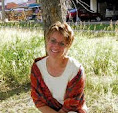Here today, gone tomorrow (well, maybe not tomorrow but soon, geological speaking)
With recent explosions from the Icelandic volcano, Eyjafjallajökull, I was reminded of how often and to what extent the Earth reshapes itself.
Two books, Fragile Earth: views of a changing world (550 Fr 2006) and Earth, then and now: amazing images of our changing world (551 PeaE 2007) are a couple of my all-time favorites because of the visual impact they have demonstrating the ever changing face of the Earth, from both natural and human forces. The books provide an absorbing look at how growing cities, war, pollution, climate change, resource exploitation, earthquakes, and tsunamis affect and change landscapes.
The books display on opposing pages, two pictures of the same place but from different times to demonstrate how the landscape has changed. Take Mount Kilimanjaro for example. Both books show the same 1974 photo of a snow-capped mountain peak. On the opposite page, each shows (with different photos) a more current photograph that demonstrates how little snow now remains.
Both books dramatically illustrate, with the same satellite photos, the extent of deforestation in the Bolivian rainforest. The picture from 1975 has a lot more green (intact rainforest) than the picture from 2003, showing how agricultural activity has affected the rainforest.
Earth, then and now also includes photos of how landscapes have been improved over time. Take a clay quarry in Cornwall , England
Though the reading level for all three books is appropriate for high school (maybe junior high, too) the pictures speak volumes and I think all kids would enjoy them and get a lot from pursuing these resources.
Join Nonfiction Monday Roundup by clicking on the box below to go to Lori Calabrese Writes blog and see a list of recent blogs dedicated to highlighting nonfiction resources.














4 comments:
Tammy,
They both look like fascinating books. Ones to remind us how small we are in the whole scope of the world!
Thanks for sharing!
Lori
These books sound fascinating. I love to look at how landscapes or streets change over decades. I have seen this in Toronto, where I am from, and I'm always shocked. I also love to see aerial shots of cities that have been developed over years and notice the vast differences.
I have made my first Non-Fiction Monday post here if you're interested.
Happy Reading!
Thanks so much so your help today, Lori. Just when I think I've gotten the hang of things...
Tammy
PeachyTO - Thanks for the recommendation. Though I'm in an education library at a university, we do get requests occassionally for books that deal with safety issues. Sounds good.
Tammy
Post a Comment